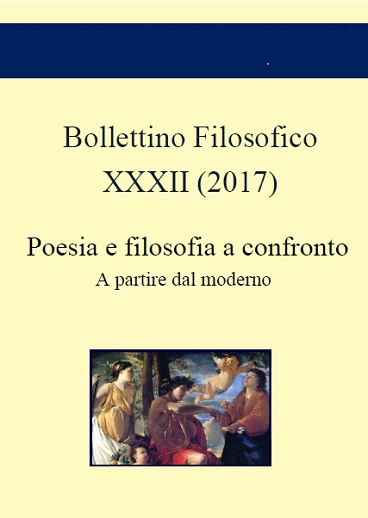The darkness of the real. Levinas poet of the y a.
DOI:
https://doi.org/10.6093/1593-7178/5359Keywords:
Levinas, il y a, Baudelaire, Shakespeare, PoetryAbstract
n his juvenile works, Levinas describes existence without existent through the concept of il y a, and individuates the main access to it in art. Precisely on the ground of this special role that art has, Levinas describes the il y a through the language of poetry, through the verses of Shakespeare and Baudelaire. The publication of Levinas' previously unpublished notes has revealed many poems which Levinas wrote before the philosophical elaboration of the concept of il y a, in many of which he makes use of images and a language which closely resemble those later used in treating the concept of il y a. In my article I make use of the unpublished notes for giving a unitary account of the philosophical theory of the il y a (and, in particular, the aesthetics with which it is bound) in relation to Levinas' poetical works, and contend that it is precisely from these that his later philosophical work takes its bearings.Downloads
Downloads
Published
How to Cite
Issue
Section
License
The author retains the copyright of his work whilst granting anyone the possibility “to reproduce, distribute, publicly communicate, publicly exhibit, display, perform and recite the work”, provided that the author and the title of the journal are cited correctly. When submitting the text for publication the author is furthermore required to declare that the contents and the structure of the work are original and that it does not by any means compromise the rights of third parties nor the obligations connected to the safeguard of the moral and economic rights of other authors or other right holders, both for texts, images, photographs, tables, as well as for other parts which compose the contribution. The author furthermore declares that he/she is conscious of the sanctions prescribed by the penal code and by the Italian Criminal and Special Laws for false documents and the use false documents, and that therefore Bollettino Filosofico is not liable to responsibilities of any nature, civil, administrative or penal, and that the author agrees to indemnify and hold Bollettino Filosofico harmless from all requests and claims by third parties.

